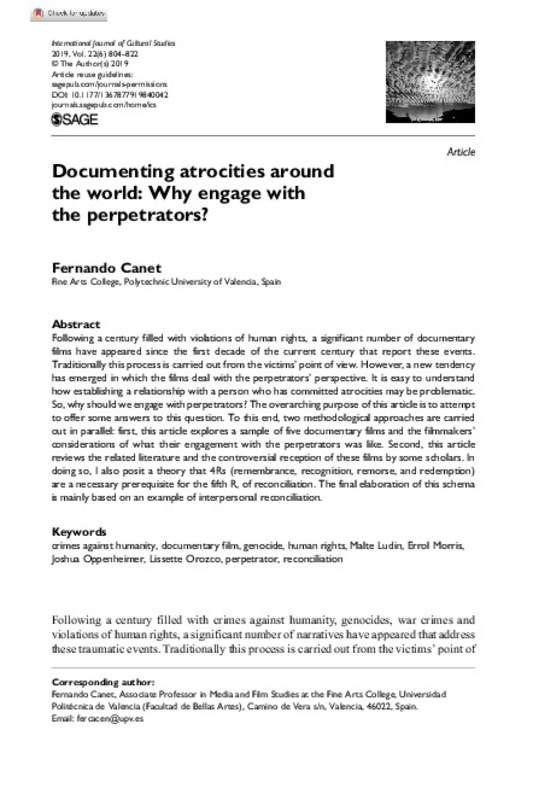Austin, T. (2011). Standard Operating Procedure, «the mystery of photography» and the politics of pity. Screen, 52(3), 342-357. doi:10.1093/screen/hjr021
Bandura, A. (1999). Moral Disengagement in the Perpetration of Inhumanities. Personality and Social Psychology Review, 3(3), 193-209. doi:10.1207/s15327957pspr0303_3
BARCUS, R. A., & BERNSTEIN, B. G. (1997). Victim-Perpetrator Reconciliation. Violence Against Women, 3(5), 515-532. doi:10.1177/1077801297003005005
[+]
Austin, T. (2011). Standard Operating Procedure, «the mystery of photography» and the politics of pity. Screen, 52(3), 342-357. doi:10.1093/screen/hjr021
Bandura, A. (1999). Moral Disengagement in the Perpetration of Inhumanities. Personality and Social Psychology Review, 3(3), 193-209. doi:10.1207/s15327957pspr0303_3
BARCUS, R. A., & BERNSTEIN, B. G. (1997). Victim-Perpetrator Reconciliation. Violence Against Women, 3(5), 515-532. doi:10.1177/1077801297003005005
Bar-Siman-Tov, Y. (2004). Introduction: Why Reconciliation? From Conflict Resolution to Reconciliation, 3-10. doi:10.1093/acprof:oso/9780195166439.003.0001
Bies, R. J., & Tripp, T. M. (s. f.). Beyond Distrust: «Getting Even» and the Need for Revenge. Trust in Organizations: Frontiers of Theory and Research, 246-260. doi:10.4135/9781452243610.n12
Borer, T. A. (2003). A Taxonomy of Victims and Perpetrators: Human Rights and Reconciliation in South Africa. Human Rights Quarterly, 25(4), 1088-1116. doi:10.1353/hrq.2003.0039
Crichlow, W. (2013). «It’s All About Finding the Right Excuse» in Joshua Oppenheimer’s The Act of Killing. Film Quarterly, 67(2), 37-43. doi:10.1525/fq.2014.67.2.37
Crownshaw, R. (2011). Perpetrator Fictions and Transcultural Memory. Parallax, 17(4), 75-89. doi:10.1080/13534645.2011.605582
Darby, B. W., & Schlenker, B. R. (1982). Children’s reactions to apologies. Journal of Personality and Social Psychology, 43(4), 742-753. doi:10.1037/0022-3514.43.4.742
Dunnage, J. (2010). Perpetrator memory and memories about perpetrators. Memory Studies, 3(2), 91-94. doi:10.1177/1750698009355672
Elizur, Y., & Yishay-Krien, N. (2009). Participation in Atrocities Among Israeli Soldiers During the First Intifada: A Qualitative Analysis. Journal of Peace Research, 46(2), 251-267. doi:10.1177/0022343308100718
Jansen, S. (2013). If Reconciliation Is the Answer, Are We Asking the Right Questions? Studies in Social Justice, 7(2), 229-243. doi:10.26522/ssj.v7i2.1045
Mann, M. (2000). Were the Perpetrators of Genocide «Ordinary Men» or «Real Nazis»? Results from Fifteen Hundred Biographies. Holocaust and Genocide Studies, 14(3), 331-366. doi:10.1093/hgs/14.3.331
Morag, R. (2012). Perpetrator Trauma and Current Israeli Documentary Cinema. Camera Obscura: Feminism, Culture, and Media Studies, 27(2), 93-133. doi:10.1215/02705346-1597222
Morag, R. (2013). Waltzing with Bashir. doi:10.5040/9780755693931
Nichols, B. (2013). Irony, Cruelty, Evil (and a Wink) in The Act of Killing. Film Quarterly, 67(2), 25-29. doi:10.1525/fq.2014.67.2.25
Ohbuchi, K., Kameda, M., & Agarie, N. (1989). Apology as aggression control: Its role in mediating appraisal of and response to harm. Journal of Personality and Social Psychology, 56(2), 219-227. doi:10.1037/0022-3514.56.2.219
Pettitt, J. (2017). Perpetrators in Holocaust Narratives. doi:10.1007/978-3-319-52575-4
Rouhana, N. N. (2004). Group identity and power asymmetry in reconciliation processes: The Israeli-Palestinian case. Peace and Conflict: Journal of Peace Psychology, 10(1), 33-52. doi:10.1207/s15327949pac1001_3
Schaap, A. (2004). Political Reconciliation. doi:10.4324/9780203002773
Schliesser, C. (2017). The Politics of Reconciliation in Post-genocide Rwanda. Alternative Approaches in Conflict Resolution, 137-146. doi:10.1007/978-3-319-58359-4_13
Shnabel, N., & Nadler, A. (2008). A needs-based model of reconciliation: Satisfying the differential emotional needs of victim and perpetrator as a key to promoting reconciliation. Journal of Personality and Social Psychology, 94(1), 116-132. doi:10.1037/0022-3514.94.1.116
Staub, E. (2000). Genocide and Mass Killing: Origins, Prevention, Healing and Reconciliation. Political Psychology, 21(2), 367-382. doi:10.1111/0162-895x.00193
Staub, E. (2006). Reconciliation after Genocide, Mass Killing, or Intractable Conflict: Understanding the Roots of Violence, Psychological Recovery, and Steps toward a General Theory. Political Psychology, 27(6), 867-894. doi:10.1111/j.1467-9221.2006.00541.x
[-]









